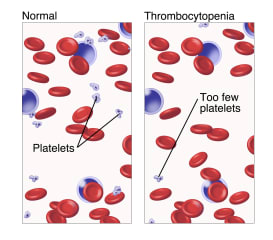Overview

Thrombocytopenia is a low number of platelets in the blood. Platelets are the cells that help blood clot. If you don't have enough of them, your blood cannot clot well. So it is harder to stop bleeding.
You may have low platelets because your bone marrow does not make them. Or your body's defenses (immune system) may destroy them.
Having an enlarged spleen can also reduce the number of platelets in your blood. This is because they can get trapped in the enlarged spleen.
Some diseases or medicines may also cause low platelets. But platelets may go back to normal levels if the disease is treated or the medicine is stopped.
You may not need treatment if your problem is mild. If you do need treatment, you may have platelets added to your blood. Or you may get medicine to stop the loss of platelets or help your body make them.
Follow-up care is a key part of your treatment and safety. Be sure to make and go to all appointments, and contact your doctor if you are having problems. It's also a good idea to know your test results and keep a list of the medicines you take.
How can you care for yourself at home?
- Be safe with medicines. Take your medicines exactly as prescribed. Call your doctor if you think you are having a problem with your medicine.
- Do not take aspirin or anti-inflammatory medicines unless your doctor says it is okay. Examples are ibuprofen (Advil, Motrin) and naproxen (Aleve). They may increase the risk of bleeding.
- Avoid contact sports or activities that could cause you to fall.
When should you call for help?
Call 911 anytime you think you may need emergency care. For example, call if:
- You passed out (lost consciousness).
- You have signs of severe bleeding, which includes:
- You have a severe headache that is different from past headaches.
- You vomit blood or what looks like coffee grounds.
- Your stools are maroon or very bloody.
Call your doctor now or seek immediate medical care if:
- You are dizzy or lightheaded, or you feel like you may faint.
- You have abnormal bleeding, such as:
- A nosebleed that you can't easily stop. This means it's still bleeding after you have pinched the nose shut 2 times for 15 minutes each time (30 minutes total).
- Your stools are black and look like tar, or they have streaks of blood.
- You have blood in your urine.
- You have joint pain.
- You have bruises or blood spots under your skin.
Watch closely for changes in your health, and be sure to contact your doctor if:
- You do not get better as expected.
Where can you learn more?
Go to http://www.healthwise.net/patientEd
Enter N724 in the search box to learn more about "Thrombocytopenia: Care Instructions".
Current as of: October 7, 2025
Author: Ignite Healthwise, LLC Staff
Clinical Review Board
All Ignite Healthwise, LLC education is reviewed by a team that includes physicians, nurses, advanced practitioners, registered dieticians, and other healthcare professionals.

